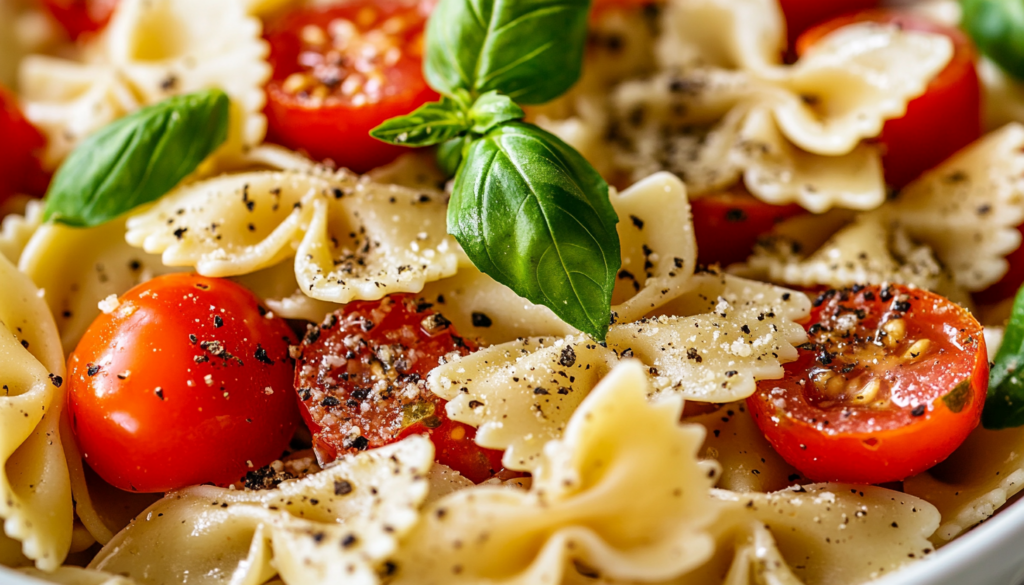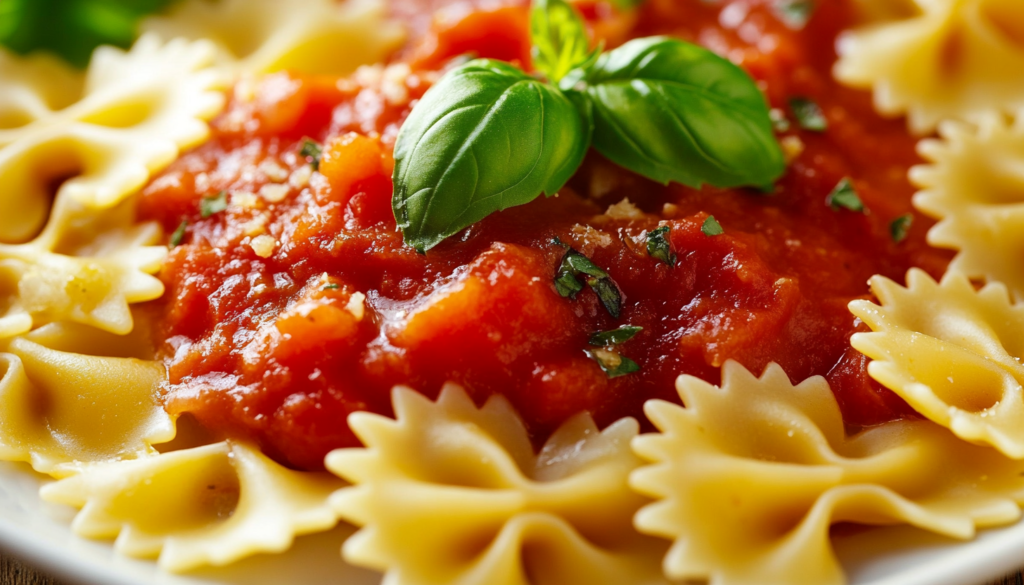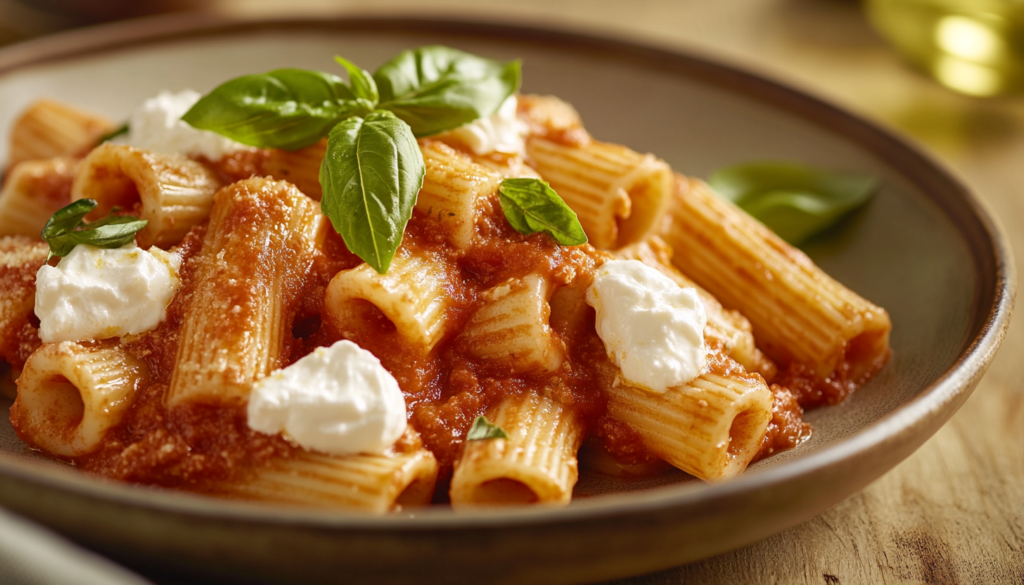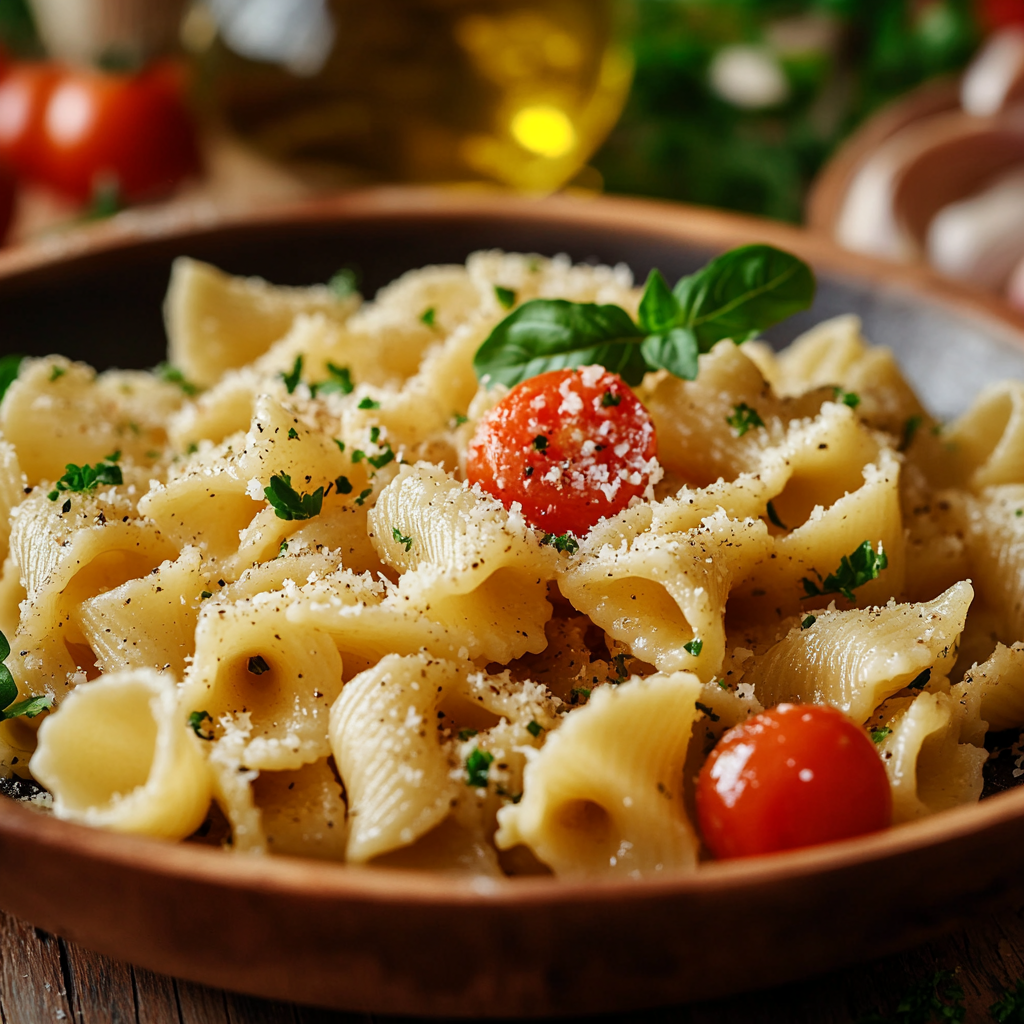I love Italian cuisine and its wide variety of pasta shapes. Campanelle pasta is a standout for me. It’s a cone-shaped noodle with ruffled edges that make it special. It’s not just for its look but also for how versatile it is in cooking.

Campanelle is also called “riccioli” or “gigli,” meaning curls or lilies. It comes from Tuscany, Italy. The name means “little bells,” fitting its bell-like shape. This pasta adds elegance to dishes and has a fun texture with its hollow center and frilly edges.
Key Takeaways
- Campanelle pasta is a cone-shaped noodle with ruffled, bell-like edges
- The name “campanelle” translates to “little bells” in Italian, reflecting the pasta’s unique shape
- Campanelle is often associated with the Tuscany region of Italy, where the lily is an iconic symbol
- This visually appealing pasta is suitable for a variety of dishes, including pasta salads, baked dishes, and more
- Campanelle’s hollow center and frilly edges allow it to effectively capture and hold onto sauces
What is Campanelle Pasta?
Definition and Origins
Campanelle pasta is a special type of pasta shaped like little bells. The name ‘campanelle’ means ‘little bells’ in Italian. It’s also called ‘riccioli’ (meaning curls) and ‘gigli’ (lilies).
The exact start of campanelle pasta is not clear. But, it’s often linked to the Tuscany region of Italy. Florence’s symbol is the lily, and it’s been on their coat of arms for a long time. This might have led to the name and shape of campanelle pasta.
“The lily is the emblem of Florence and has been part of the city’s coat of arms for around one thousand years. The connections between lilies and the Tuscany region may have inspired the name and design of this unique pasta shape.”
Whether you call it campanelle, riccioli, or gigli, this Italian pasta is a great choice for cooking. Its unique shape looks good and works well with many sauces and fillings.
The Many Names of Campanelle
Campanelle pasta is a delightful and versatile type of Italian pasta. It is known by several names in Italy. The name “gigli” means “lilies” in Italian, which suits its bell-like shape with ruffled edges.
It is also called “riccioli,” meaning “curls,” and sometimes “gigli toscani,” linking it to Tuscany. This shows its deep roots in Italian cooking and its varied recognition across the country.
Whether you call it campanelle, gigli, or riccioli, this pasta is a true symbol of Italy’s rich food culture.
| Pasta Name | Meaning | Region |
|---|---|---|
| Campanelle | “Little Bells” | Italy |
| Gigli | “Lilies” | Tuscany |
| Riccioli | “Curls” | Italy |
| Gigli Toscani | “Tuscan Lilies” | Tuscany |
The different names for campanelle pasta show its rich cultural background. They highlight how it is recognized and celebrated in various Italian regions.

Availability and Sourcing
Where to Find Campanelle Pasta
Finding campanelle pasta can be tough, even in Italy. Big names like Barilla, De Cecco, and La Molisana make it, but mostly for export. In my area, it’s hard to find in supermarkets.
If you want to buy this special pasta, try specialty Italian stores or online shops. Many small makers in Italy sell it directly online. This way, fans like me can get it without going to Italy.
| Brand | Availability | Where to Buy |
|---|---|---|
| Barilla | Widely available | Major grocery stores, online retailers |
| Sfoglini | Limited availability | Specialty Italian stores, online |
| Local Italian Artisans | Limited availability | Online direct from producers |
Finding campanelle pasta takes some work, but it’s worth it. Its unique texture and shape are special. With some effort, you can enjoy this regional Italian treasure.
campanelle pasta
Campanelle pasta is a standout in the world of Italian pasta. Its cone shape and semolina base make it unique. The ruffled edge not only looks great but also holds sauces well. Whether it’s creamy alfredo or hearty meat ragu, campanelle makes every bite special.
The name “campanelle” means “little bells” in Italian, fitting its bell-like shape. Its hollow inside and ridged outside trap sauces perfectly. This makes it a favorite for many Italian dishes. It’s perfect for both casual meals and fancy dinner parties.
| Yield | Prep Time | Cook Time | Total Time |
|---|---|---|---|
| 4 servings | 15 minutes | 25 minutes | 40 minutes |
Campanelle’s semolina base makes it firm and al dente. It’s great with strong sauces and big ingredients. Whether with sautéed mushrooms and peas or a classic Tuscan ragu, it’s a hit.
We’ll explore campanelle’s history, where to find it, and its many uses next. Get ready to fall in love with the amazing campanelle pasta!

Traditional Tuscan Recipes
Pasta Tordellata
In the heart of Tuscany, campanelle pasta is a key ingredient in many traditional dishes. One such dish is the beloved pasta tordellata. It’s a twist on the classic Maremma tortelli Maremmani, celebrating Tuscan flavors.
The dish features the filling outside the pasta, over campanelle, with a rich meat ragu. This mix of frilly campanelle, creamy ricotta and chard filling, and hearty Tuscan-style ragu is a treat.
| Ratings | Prep Time | Cook Time | Total Time | Servings | Pasta Amount |
|---|---|---|---|---|---|
| 5 out of 38 votes | 20 minutes | 1 hour 30 minutes | 1 hour 50 minutes | 4 people | 400 g (14 oz) |
The ragu is made with minced beef, pork, and Italian sausage, cooked with red wine, rosemary, and tomatoes or tomato passata. The ricotta sauce combines fresh Swiss chard and creamy ricotta, seasoned with nutmeg.
While campanelle is the traditional pasta, other shapes like pappardelle, penne, and vesuvio also work well. The goal is to highlight the campanelle’s unique texture with rich, Tuscan-inspired flavors.
“The pasta tordellata is a true celebration of Tuscan culinary heritage, seamlessly blending the iconic campanelle pasta with the robust flavors of the region.”
Exploring italian regional cuisine or just wanting to try something new? The pasta tordellata is a must. It’s a dish that highlights the deliciousness of campanelle pasta.
Versatility and Pairing Suggestions
Campanelle pasta is a versatile choice for many delicious Italian dishes. Its ridged, hollow shape holds sauces well. This makes it great for creamy sauces and meat-based ragus.
Campanelle pasta goes well with leafy greens, cured meats, and seafood sauces. It’s also perfect for baked pasta dishes. Its sturdy structure doesn’t get mushy when cooked.
| Pasta Type | Ideal Sauce Pairings |
|---|---|
| Campanelle | Butter/oil, Cream/cheese, Meat, Pasta salad, Vegetable |
| Casarecce | Cream/cheese, Meat, Pesto, Seafood, Tomato, Vegetable |
| Fusilli | Baked, Butter/oil, Cream/cheese, Meat, Pasta salad, Pesto, Soup, Tomato, Vegetable |
| Linguine | Butter/oil, Cream/cheese, Meat, Pesto, Seafood, Tomato, Vegetable |
| Macaroni | Baked, Butter/oil, Cream/cheese, Meat, Pasta salad, Tomato, Vegetable |
Campanelle pasta is great for many Italian dishes, from creamy bakes to fresh salads. Its unique shape and texture make it a standout in pasta pairings and pasta sauces of Italian cuisine.
Artisanal Production
Major brands make campanelle pasta, but small, artisan Italian pasta makers also shine. They use old-school methods and top-notch, local ingredients. This care makes their campanelle stand out, showing off Italy’s deep food culture.
Looking for these artisanal offerings lets you truly get what campanelle pasta is all about. These pasta crafters keep the traditional pasta making alive. Each piece of campanelle shows off their skill and love for Italian cooking.
Italian pasta makers pick the best durum wheat and shape each campanelle by hand. Their hard work and love for quality shine through in the taste, feel, and look of their artisan pasta.
“Campanelle pasta is a true expression of Italian culinary craftsmanship. When you taste an artisanal version, you can feel the passion and tradition in every mouthful.”
Supporting these pasta artisans means enjoying amazing campanelle pasta and helping keep Italy’s food heritage alive.
A Visual Delight
The Beauty of Campanelle
Campanelle pasta is a feast for the eyes with its unique shape and ruffled edges. It’s not just for looks; it’s great at holding onto sauce too. This makes it a standout in Italian dishes.
It looks like an Italian bell flower, showing the skill in making traditional Italian pasta. Campanelle’s beauty makes it a highlight in Italian cooking.
Campanelle pasta brings elegance to any dish, whether it’s a classic Tuscan meal or something new. Its beauty enhances the dining experience and honors Italian culinary traditions.
“Campanelle pasta is a true work of art, a delightful blend of form and function that celebrates the beauty of Italian culinary traditions.”
From its simple beginnings to being a favorite, campanelle has always caught the eye. It’s a treat for the senses, a must-try for pasta lovers exploring Italian cuisine.
Serving Suggestions and Recipes
Campanelle pasta is a great choice for many Italian dishes. It’s perfect for creamy or tomato-based sauces, and even meat ragus. Its shape also makes it great for baked pasta dishes.
I love tossing campanelle with pesto. The pasta’s frilly edges soak up the sauce’s flavors. Or, try it with sautéed greens and crispy pancetta for a mix of tastes.
For a bigger meal, campanelle is perfect in casseroles. It holds up well with sauce, cheese, and other ingredients. A favorite recipe of mine is a baked campanelle with Alfredo sauce, chicken, and veggies.
| Ingredient | Quantity |
|---|---|
| Campanelle Pasta | 1 pound |
| Frozen Sausage | 1 1/2 pounds |
| Boneless, Skinless Chicken Thighs | 2 |
| Frozen Sweet Corn | 1 cup |
| Baby Spinach | 5 cups |
| Medium Red Onion | 1 |
| Chopped Cilantro | 3/4 cup |
| French Fried Onions | 6 ounces |
| Alfredo Sauce | 2 jars |
Campanelle pasta is a top pick for Italian cuisine. It’s great with pestos, meat sauces, or creamy casseroles. This frilly noodle will impress and delight your taste buds.
Celebrating Italian Culinary Heritage
Campanelle pasta shows off the rich culinary heritage of Italy, especially from Tuscany. It’s known by names like ‘gigli’ and ‘riccioli’, showing its deep ties to Italian culture. By keeping campanelle and other regional pasta shapes alive, we honor the skill passed down through Italian pasta makers.
Preserving Regional Pasta Traditions
Sharing the stories of traditional pasta helps keep Italian cuisine vibrant. The “Festa Dei Gigli” in Nola, Italy, has been a big event for over a thousand years. It features huge obelisks shaped like lilies, carried by many to the sound of music.
Campanelle and Gigli pasta, shaped like lilies, are great for authentic Italian dishes. Using these regional pastas lets us celebrate Italy’s rich history and diversity. It’s a way to honor the campanelle pasta, italian cuisine, regional pasta, and culinary heritage of Italy.
“The menu features Spinach Tagliatelle with wild mushrooms and truffle oil as one of the pasta options.”
It’s important to keep the traditions of these unique pasta shapes alive. By exploring and enjoying Italy’s culinary heritage, we pay tribute to the many artisans who have made these pastas. They have spent their lives perfecting these beloved dishes.
Conclusion
Exploring campanelle pasta has shown me its unique beauty and its deep roots in Italian cuisine. This special pasta shape comes from Tuscany and is loved for its versatility. It shows the care and creativity in Italian cooking.
Trying campanelle lets us enjoy its unique tastes and textures. It’s perfect for many dishes, from hearty sauces to fresh veggie mixes. This pasta is a blank slate for cooks to get creative and keep traditional recipes alive.
I’m excited to try more of Italy’s diverse pasta shapes and dishes. Campanelle teaches us to value the rich food traditions of Italy. It’s a way to connect with the world’s food lovers and celebrate the art of cooking.
FAQ
What is campanelle pasta?
Campanelle pasta is a type of pasta shaped like a bell. It has a ruffled edge that looks like the Italian bell flower.
What are the other names for campanelle pasta?
Campanelle is also called ‘riccioli’ and ‘gigli’. ‘Riccioli’ means curls, and ‘gigli’ means lilies in Italian.
Where does campanelle pasta originate from?
Campanelle pasta is linked to Tuscany, Italy. The lily is Florence’s symbol and has been on the city’s coat of arms for a long time.
How easy is it to find campanelle pasta?
Finding campanelle pasta can be hard in some places. Look for it in specialty Italian stores or online.
What is the texture and shape of campanelle pasta?
Campanelle pasta is shaped like a cone with a bell-like edge. It’s made from semolina and has a unique shape and texture.
How is campanelle pasta used in traditional Tuscan recipes?
In Tuscany, campanelle is used in dishes like ‘pasta tordellata’. It pairs well with rich ragu and chard and ricotta filling.
What dishes can campanelle pasta be used in?
Campanelle works well with creamy sauces and meat ragus. It’s also great for baked pasta dishes.
How do artisanal Italian pasta makers approach campanelle production?
Artisanal pasta makers in Italy take pride in making campanelle. They use traditional methods and quality ingredients.
What makes the visual appeal of campanelle pasta unique?
Campanelle’s shape and edges make it stand out. It looks like the Italian bell flower it’s named after.
How does campanelle pasta showcase the culinary heritage of Italy?
Campanelle’s names like ‘gigli’ and ‘riccioli’ show its connection to Italian culture. Making this pasta helps honor Italian pasta makers’ skills.

